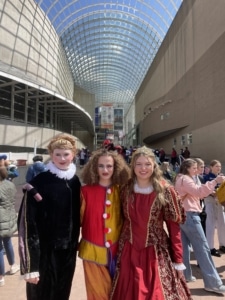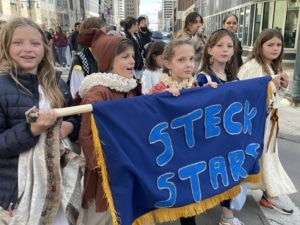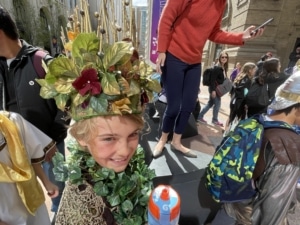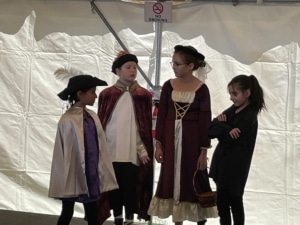DCPA NEWS CENTER
Enjoy the best stories and perspectives from the theatre world today.
Enjoy the best stories and perspectives from the theatre world today.
Former Rocky Mountain News Theatre Critic Lisa Bornstein and current fourth grade math teacher at Polaris Elementary School gives her first-hand account of her school’s participation in the 40th annual DPS Shakespeare Festival.

DPS Shakespeare Festival, 2023
It was 10am on Friday, April 26 when downtown Denver’s Skyline Park came alive with Roman senators, harlequins, a living brick wall and Juliets from here to Verona. For the 5,000 Denver Public Schools students, teachers and audience members, the 40th annual Shakespeare Festival was an opportunity to perform, to learn a foreign language (Elizabethan English), and to come together with like-minded folks. Amid the ruffs, capes, doublets and brocade, Polaris students were notable for their flipped polo shirts, neon blouses, big hair and jean jackets, as they prepared to stage their John Hughes, ’80s romance interpretation of Romeo and Juliet.
The performers were welcomed by high school students including Denver School of the Arts senior Sam Charney, dressed as a harlequin crowned by an orb of blond curls. “I am proud of every single one of you glorious people for not only showing up here but also showing up as your true self,” they told the crowd of students. “As Shakespeare said in Hamlet, ‘To Thine Own Self Be True.’ I think that is something that we should always practice, being true to ourselves. Even if people tell you to hide, share your spark with the world, but keep a close eye on that flame, we wouldn’t want the Globe to burn down again.”
With that, the students were parading toward the Denver Performing Arts Complex, site of this year’s festival. For the students from Polaris Elementary, it was the culmination of work begun in October, under the direction of music teacher Corrilee Kielmeyer (assisted by me). For seven months, students had given up other activities offered at Polaris to audition, rehearse, delve into the meaning of the language, memorize pages of unfamiliar words and come together as a mutually supportive cast. Today, they would recognize their greatest honor: Performing inside the Bonfils Theatre Complex on the Joe Craft stage, named after the founder of this, the oldest and largest student Shakespeare festival in the nation.

DPS Shakespeare Festival, 2023
Kielmeyer has been directing the Polaris cast for nearly 20 years. When asked what students gain from the festival, she inhaled deeply. “So much. They gain so much confidence and depth,” she said. “The Shakespeare characters specifically lend themselves to depth and complexity,” both of which are priorities of DPS.
The festival has changed somewhat over the years.
“Joe Craft was very explicit in his vision for the show. He didn’t want students to wear tennis shoes at all. He had shoe covers for them,” Kielmeyer said. “The other thing that Joe Craft was really specific about was the language piece. You could use direct translations, you could cut, and you could connect people, but it had to be Shakespearean language. The music had to be from Elizabethan Era. Now you can add musical pieces if you’re experimenting with setting. I think it makes things more relevant.”
From a language arts standpoint, it’s extraordinary – and deeply moving – to watch students develop an understanding for sometimes archaic language and an empathy for their characters. A little translation may be involved: “Imagine a bunch of high school boys, showing off and proving how tough they are,” goes the direction for Benvolio, Tybalt and Mercutio. For Romeo: “He was one of those tough guys, but now that he’s met Juliet, he’s all peace and love and rainbows and butterflies.” Students who could barely raise their voices above a whisper astound with the rage, romance and comedy they are able to muster.

DPS Shakespeare Festival, 2023
On the day of the festival, after checking out performances from other schools in tents spread across the lawn, the Polaris cast, made up of fourth- and fifth-graders, spontaneously decided to squeeze in one more rehearsal in front of the Bonfils Complex – or was it guerrilla theater?
“When Romeo and Mercutio fight, should I step aside or join the fight?” asked fourth-grader Laurie Marquette.
“What do you think your character would do?” Kielmeyer responded.
By 11:51am, students proclaimed their starvation and settled in to eat home-packed lunches and check out DCPA Cabaret’s Improvised Shakespeare Company®, which pulled a slyly smiling fourth-grader, Will Blood, onstage with them for a word additive improv game. By 12:30, they were settled in to view DCPA Education’s Shakespeare in the Parking Lot, whose interpretation of A Midsummer Night’s Dream was set among the staff of Every Mother’s Son Auto company.
At 2:07pm an excited crew of performers took the stage in the lobby adjoining the Wolf Theatre, as their parents and others filled in the audience. It was the culmination of all their work, if not the only performance – students would bring their work back to Polaris two weeks later for the school’s For the Love of the Arts event. In keeping with the ’80s high school theme, slap fights replaced swordplay. Wayfarer sunglasses were flipped for dramatic effect, and Romeo entered the balcony scene with a boombox on his shoulders.

DPS Shakespeare Festival, 2023
For fifth-grader Leo Lane – one of the school’s three Romeos – it was his second and final performance in the Polaris group, although he was hoping to continue in middle school. ”I thought his plays had very interesting stories, and I just thought that it would be a good experience,” Leo said a few days later. “I’ve taken the time to memorize my lines, and I’ve put thought into my costume, so that they will work with our scene.
“I’ve been able to learn more about Shakespeare and I’ve been able to improve my acting skills, and I’ve been able to socialize with people that also have the same interests,” he continued.
Eight days before the festival, the Polaris students had come together for their final scheduled rehearsal. After all these months and fully off-book, the cast was able to drill down into character and pronunciation. They raised hands in the air, signaling to those onstage to project more. Romeos and Juliets hid their faces behind their hands to disguise the fact that 10- and 11-year-olds don’t care to kiss privately or publicly.
“I do not bite my thumb at you, sir, but I bite my thumb, sir,” said fourth-grader Emanuel Martel, full of mischief and bravado as Sampson, whom he described as “a teenager, one of those guys who thinks he rules the world, thinks he’s the most popular person and tries to be that. He has some good qualities. He believes in himself a lot, I think. Sometimes he might believe in himself too much.”
Martel loved his time in rehearsal and onstage. “I know how to better express myself. I have a lot more confidence,” he said.
“It just sounded fun and I signed up and I loved it. Everybody is putting their heart into the play, and we’re making something awesome.”
